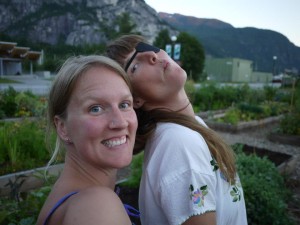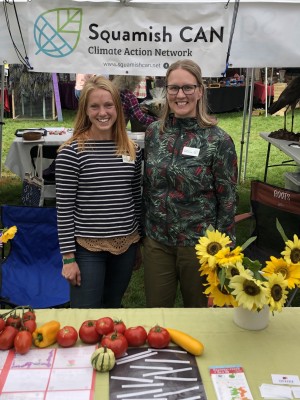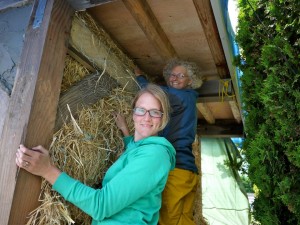Krystle Tenbrink
Krystle tenBrink
"There are many small things that people can do at home, or at work that can feel like a step in the right direction."
 Please choose the one area of climate action that you feel that your actions most closely relate to:
Please choose the one area of climate action that you feel that your actions most closely relate to:
Reducing landfill waste
Please describe in detail a couple of the main climate actions you are taking to reduce emissions in your own life:
I am thankful to have learned early on in my adulthood about the impacts that our food and food choices have on our health and natural environments. For over a decade, I have been able to have a garden that provides me an abundance of fresh vegetables and herbs, ongoing learning opportunities, and a chance to connect with others. Each year, I look forward to attending local food and farm events, such as Pemberton's Annual Slow Food Cycle and the Brackendale Fall Fair. When travelling, I make it a priority to visit farms that welcome visitors and always look forward to sampling local food products—goat cheese farms being a personal favorite!
 I have made it a priority to purchase fruits and vegetables from farmers who use regenerative agriculture practices. Regenerative agriculture practices helps improve biodiversity, soil health, conservation and more. When choosing seafood options, I only purchase seafood that is Ocean Wise, recommended through their certification program. A few of the small companies fishing in the West Coast, are now offering online purchasing and delivery, or setting up at a local farmers market. Where possible, I buy direct from the food grower or producer. This helps ensure the folks doing the majority of the work (fishing, farming, etc.), benefit the most, versus buying from a third party, like a grocery store. When purchasing meat, I choose options that have the lowest carbon footprint as a first option, such as chicken, turkey and seafood. On the rare occasion, I will purchase beef from Hop Creek Farm that is grass fed and grass finished, as well pork from Stony Mountain Farm; both of which are in Squamish.
I have made it a priority to purchase fruits and vegetables from farmers who use regenerative agriculture practices. Regenerative agriculture practices helps improve biodiversity, soil health, conservation and more. When choosing seafood options, I only purchase seafood that is Ocean Wise, recommended through their certification program. A few of the small companies fishing in the West Coast, are now offering online purchasing and delivery, or setting up at a local farmers market. Where possible, I buy direct from the food grower or producer. This helps ensure the folks doing the majority of the work (fishing, farming, etc.), benefit the most, versus buying from a third party, like a grocery store. When purchasing meat, I choose options that have the lowest carbon footprint as a first option, such as chicken, turkey and seafood. On the rare occasion, I will purchase beef from Hop Creek Farm that is grass fed and grass finished, as well pork from Stony Mountain Farm; both of which are in Squamish.
Please describe in detail something you are doing toward broader community climate action:
I am a founding member and Director of Food Systems and Strategic Initiatives for Squamish CAN (Climate Action Network) and the Squamish Food Policy Council and have been establishing community food assets and programs since 2009. A few of these programs include the community gardens, the Mamquam Edible Schoolyard (MESY), food education workshops, and advancing food system policy and strategy at a local and regional level. Some of these policies and strategies aim to remove barriers for Squamish residents who want to grow their own food such as having backyard chickens and greenhouses, as well as identifying opportunities and actions to strengthen our agriculture within the community of Squamish. Squamish CAN is also dedicated to helping Squamish zero waste strategies and help increase more sustainable methods of transportation and energy efficiency.
 What has inspired you to take climate action?
What has inspired you to take climate action?
In university, I had the privilege to learn and study about the many local and global environmental issues that we face today. A few of these issues include overfishing, loss of biodiversity, threatened fresh water supply and climate change. I also had the chance to hear first-hand from guest speakers about some of the most threatening issues in British Columbia. The first speaker I heard was Alexandra Morton (Gwayum'dzi), who has dedicated the past 40 years of her life to restoring the balance between people and wild salmon off the coast of BC. Specifically, she exposed the ugly truth about Canada's open-net salmon farms that are located on the major salmon migration routes. I was in awe at how passionate, informative and actionable she was in her work. It was then that I knew I wanted to dedicate my professional and personal journey to issues that improved the health of both our natural environments and humans.
Shortly after moving to Squamish in 2007, I had been working in tourism at the Squamish Adventure Centre, while finishing my degree, I was eager to find community and my passion. It was not long till I met a local woman named Ana Santos. She had come into my work and asked about hosting an eight week movie series on climate change. This piqued my interest and I was offered to volunteer my time to open the building/theatre, help find some donations and assist with getting the word out. At the first movie night we had about 20 Squamish members show up, by the eighth movie night we were over capacity and had over 80 people squished in a 40-person theatre. At each event, Ana brought many important issues forward for Squamish folks to learn and discuss. She welcomed special guests, brought her sassiness and humor to emceeing each night, and made everyone feel welcomed. During those eight nights, not only was I a sponge for information, but I had met many new folks and was loving the engaging conversations with so many of the community members that joined us. By the eighth event, it became clear we needed to meet for beers at the Brew Pub and figure out what we can do about climate action in Squamish. And that is what we did. Squamish CAN was established in 2009 and whose mission is to educate, support, and empower the community of Squamish by developing, promoting, and implementing sustainable strategies to mitigate and adapt to climate change.
Fast forward a decade and I am still just as passionate for climate action as I was listening to Alex in university and Ana during the movie series. Over time, I have focused my efforts specifically towards food systems with a deep appreciation for the connection between food and human health.
What advice do you have for Squamish community members who are looking to get involved with climate action?
I know how climate change can often feel like a daunting global issue, but there are many small things that people can do at home, or at work that can feel like a step in the right direction. Here are a few suggestions:
- Find organizations, governments, businesses or people that are doing climate action, specifically in topics that you are interested in learning more about. This can be as small as improving your waste systems at home or helping one of the many campaigns against deforestation and forest degradation. One of my personal favorites is: davidsuzuki.org/queen-of-green/
- Consider donating any amount to an organization that aligns with you or your family’s values. While you may not have the time right now to take lead on an important issue, you can be a part by financially supporting one. No dollar amount is too small. Be sure to keep your receipt to write it off!
- Consider offering to lead, or support sustainability efforts at your place of employment or child's school. Grassroots climate action is important and can often be rewarding to be a part of bringing folks together for a common goal while making an impact.
- Look for volunteer opportunities. With Squamish CAN, we communicate our volunteer opportunities in our e-newsletter at squamishcan.net and through volunteerconnector.org. Volunteering is a wonderful way to build community and meet like-minded individuals.
